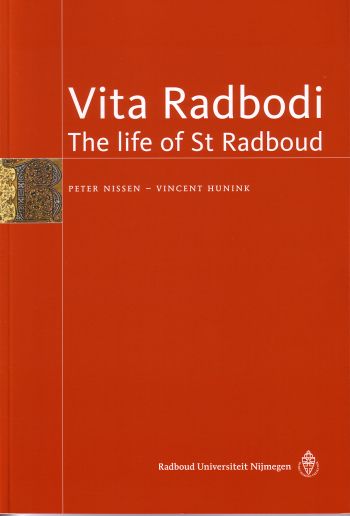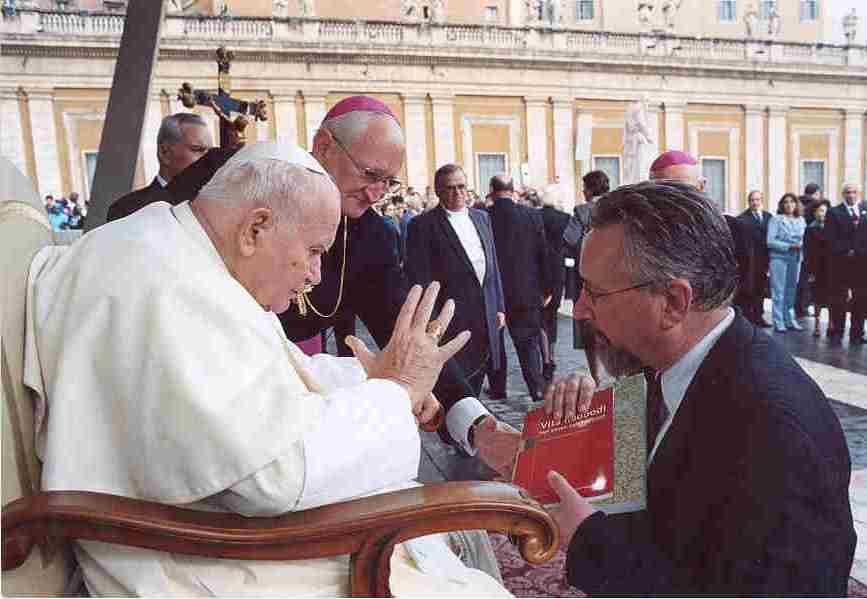|
VincentHunink |
|
|
HOME | VERTALINGEN | ALLE PUBLICATIES | INDEX | CONTACT |
|
introduced, edited and translated,
[bilingual edition
Latin-English] As of September, 2004 the Catholic University of Nijmegen has changed its name to Radboud Universiteit Nijmegen. Saint Radboud is mainly known from some early sources, notably a Latin hagiography from the 10th century. On the occasion of the change of names, this Latin life has been edited with an English translation. This is the first version of the text into English. The book (60 pages) has been edited by Peter Nissen, professor of church history, and Vincent Hunink, lecturer in Latin and Christian Latin, both at the Radboud University Nijmegen. For those who master the Dutch language, the original edition with Latin text and Dutch introduction and translation is available as from September, 6th 2004. This English version of the book has been published by the Radboud University exclusively for its relations abroad (November 2004). Anyone who is interested, may contact me.
(#1) Soon
his earliest years were over and his parents had him taught how to read and
write. He passed his childhood with his uncle, bishop Gunther of the church of
Cologne. Thus the blossom of his youth was tamed by the strict regimen of the
school. But as this bishop fared less well, Radboud’s soul did not suffer any
loss, so we may believe. At the suggestion of his parents and by common consent
(for he seemed irradiated by God’s grace and was loved by all), the highly
gifted boy went to the court of Charles, king of the Franks and also son of the
emperor Louis. This was not due
to eagerness for courtly honour, but because at the time the sevenfold
philosophy was particularly practiced within the walls of the royal palace. This
training school was taken care of by the philosopher Manno, who kept it on the
short rein of wisdom. The young saint, being highly motivated and inquisitive,
did not move from his side. As his companions and fellows who shared this life
there he had Stephen and Mancio, his superiors in age, though not in motivation.
Soon a secret, moral rivalry arose among them: who could outdo the other, not in
searching for honour and glory, but in showing humility, not in the spines of
jealousy, but in feelings of friendship and dedication to reading. Their merits
were surpassed by Radboud, but not long afterwards they both obtained an
episcopal see, Stephen in the church of Tongeren, Mancio in Chalon-sur-Saône. Like
a bee, this venerable young man dived into the flowers of the high arts, without
ever losing the flavour of the sweetness he tasted, getting intoxicated through
the nectar of heavenly dew. He particularly applied himself to the threefold
philosophy, until he was nursed at the twin breasts of wisdom to such an extent
that he excelled among all through his great knowledge. With
these activities he managed to overcome the years of his youth through mental
strength, mortifying his rebellious body with the salt of austerity, disparaging
wordly affairs by comparison with heavenly affairs, putting his heart and soul
to spiritual enjoyments, being determined to keep his distance from all that is
transitory. Already at an early age, he possessed character of an old man: he
did not let himself be trapped by any temptation and wanted to please only God.
Night and day he spent his time to spiritual banquets, thereby shaping in
himself the traits he was to put into practice later on.
Peter Nissen presents a copy of the book to pope John Paul II during a visit of the Vatican (early 2005)
REVIEWS
compte rendu par Fr. D e V r i e n d t in: Analecta Bollandiana 125, 2007, (442-)443 (...) Dès lors, si la présente édition ne manque pas de soin (les A. indiquent notamment les variantes de l'édition de Surius [1575]), on aura deviné qu'elle n'atteste pas de grandes divergences avec les précédentes. L'apport des traductions, assez littéraires - la toute première en anglais, la prmière intégrale en néerlandais - se révèle en revanche nettement plus substantiel. Cette plaquette, maniable et élégante, ne renouvelle donc pas fondamentalement nos connaissances sur le prélat carolingien, mais rendra néanmoins d'indéniables services et fera date dans l'historiographie du saint.'
|
|

